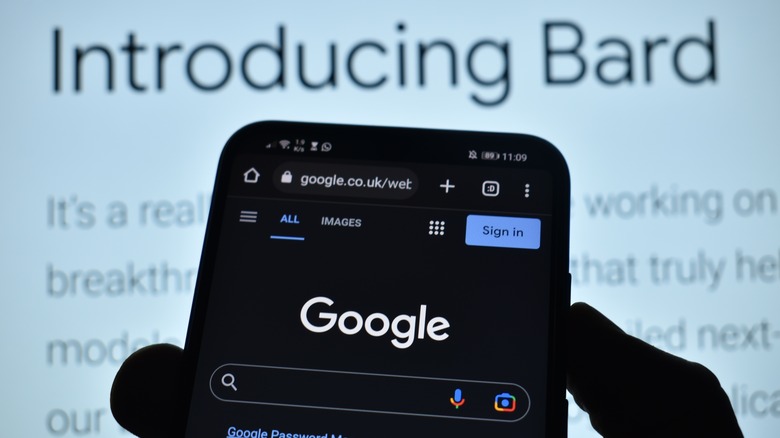Google's Bard Just Gave An Expensive Lesson On AI's Big Problem
Microsoft and Google are currently locked in a race to get a conversational AI added to their respective search engines, and at this time, it looks like Microsoft's Bing Chat will beat Google's Bard to the punch. Both companies introduced their products and some details on their plans over the past couple of days, though neither chatbot is fully available for anyone to use quite yet. Despite that, Microsoft and Google have shown demonstrations of their AIs in action, and they look pretty impressive.
A conversational AI's seemingly magical ability to generate natural language responses to questions can leave users with the impression that the AI is more of an authority than it actually is. In reality, these chatbots essentially scrape information and reassemble it into a response, and the result is a reply that sounds like it could be a fact even if the details presented are entirely false. Google unintentionally gave the public a demonstration of this harsh reality in the form of a Bard AI advertisement on Twitter.
Google Bard AI gave incorrect information in advertisement
In a tweet — that as of publication is still live on its Twitter account — Google shared a GIF of Bard in action. The conversational AI is depicted responding to questions from an unseen user, including one about the James Web Space Telescope. One of the generated responses in the chatbot's thread was inaccurate, however, claiming that the JWST was the first to find an exoplanet outside of our solar system — an achievement that actually belongs to the ESO, which made the discovery nearly 20 years ago using its VLT, according to Reuters, which first reported on the mistake.
Some have interpreted the AI's response in a more charitable way, claiming that it was referring to a specific exoplanet called LHS 475 b that was discovered by the JWST. Even if that were the case, the public's response shows that the AI — and others like it — must be able to clearly communicate information to prevent misunderstandings.
Bard is an experimental conversational AI service, powered by LaMDA. Built using our large language models and drawing on information from the web, it's a launchpad for curiosity and can help simplify complex topics → https://t.co/fSp531xKy3 pic.twitter.com/JecHXVmt8l
— Google (@Google) February 6, 2023
Though that's no doubt an embarrassing oversight for Google, it does serve as a nice example of what can go wrong with these chatbots — namely, that they may present inaccurate information in a seemingly authoritative way, potentially leaving readers convinced that false statements are true. As expected, Google was quick to issue a statement on the mistake, with a spokesperson telling Reuters that the company will use feedback from its newly-announced tester program, among other things, to make sure "Bard's responses meet a high bar for quality, safety and [are] groundedness in real-world information."
Despite that intention, the foible has already cost Google dearly, and not just when it comes to embarrassment. As reported by Reuters, the company's shares plummeted 8% in the hours following the release of the demonstration, representing billions in lost market value. The very public mistake combined with recent reports that Google was scrambling to launch its own AI alternative in the face of serious competition from Microsoft and OpenAI may have been enough to spook investors — for now, at least.

